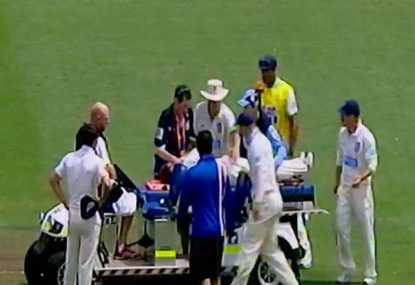'This is the Starc comeback!' Mitchell back to his best, demolishes Mumbai in barnstorming over
As wife Alyssa Healy watches on, Mitchell Starc was back in form, taking three wickets in an over including the dangerous Tim David, to…

Twenty-four hours beforehand, the Australian Broadcasting Corporation had public opinion on its side in the wake of government-imposed budget cuts.
UPDATE: Phillip Hughes has tragically passed away.
Then Phil Hughes, playing a Sheffield Shield match for South Australia and vying for selection in the Australian Test cricket team, was hit in the head by a fast delivery.
As he was airlifted to hospital, the ABC turned a ‘no comment’ into, “Cricket NSW could not confirm if Phil Hughes was alive when he left the SCG.’
It was an unusually ham-fisted tweet from the public broadcaster, which in its news generally prides itself on fact.
MORE:
» Phil Hughes in critical condition after surgery
» Let’s have no blame games with the Phil Hughes incident
» Sport just doesn’t matter right now. It’s about Phil Hughes
» LEMON: Cricket’s lottery sees Phil Hughes knocked into morality
» MITCHELL: A time of introspection for cricket
The recriminations were swift and vehement, with News Corporation leading the charge even when its own Daily Telegraph was busy tweeting photos of the moment of impact and of Hughes falling face-first to the ground. It too copped a storm of abuse.
So often these days, news crosses the line into voyeurism.
In the initial flurry of a story and the rush to be first with a development, particularly on social media, public interest is given a very broad mandate.
We see celebrity bodies wheeled out of luxury apartments. People clutching lifeless relatives in war zones. Ray Rice punching his wife in an elevator. People jumping from the twin towers. Defendants scrambling down the street with cameras and microphones shoved in their face. Africans in the final throes of Ebola. A stricken batsman felled.
How much of this is news and how much titillation? I don’t have a ready answer. I thought the Ray Rice footage shone a necessary light on domestic abuse but I understand the concerns of others decrying the invasion of his wife’s privacy.
On the other hand, I don’t believe we’re entitled to know about the drug paraphernalia found at the scene of Philip Seymour Hoffman’s death. Surely the fact that he died of a drug overdose is information enough.
Same with Robin Williams. What gives us the right to be told the manner in which he took his life or, for that matter, the circumstances that might have influenced his decision?
These sorts of details give us a false proximity to the story. They give us a connection to people we don’t know, a front row seat to their world.
As a cadet journalist many moons ago, I had to do a number of what the industry calls ‘death knocks’. That’s when a reporter, usually of ridiculously tender years, knocks on the door of a family raw with grief and asks them how they feel.
It’s breathtakingly intrusive, yet you’d be surprised how many people open up in the shock of the moment. Often they’re told that good may come of their story, that speaking out may prevent a particular situation from occurring again.
I never felt comfortable with the assignment yet I always knocked on that door. I never pressured anyone into speaking to me yet I always asked the question.
I never once got an interview. The closest I came was when I visited a family whose 16-year-old son had committed suicide only that afternoon. The father answered the door.
“I’d like to talk,” he said quietly, looking back down the hall. “But my wife, I’m not sure she’d…”
I left. His wife was by far more important than my newspaper’s readers. In clearer mind he would recognise this too but I have no doubt that in that moment I could have persuaded him otherwise.
The encouraging aspect of what unfolded on Twitter on Tuesday was that any media outlet straying into the unsubstantiated or disrespectful was brought quickly and vociferously to account.
A life was in the balance. This was not a show. And there was no place for dramatic licence.